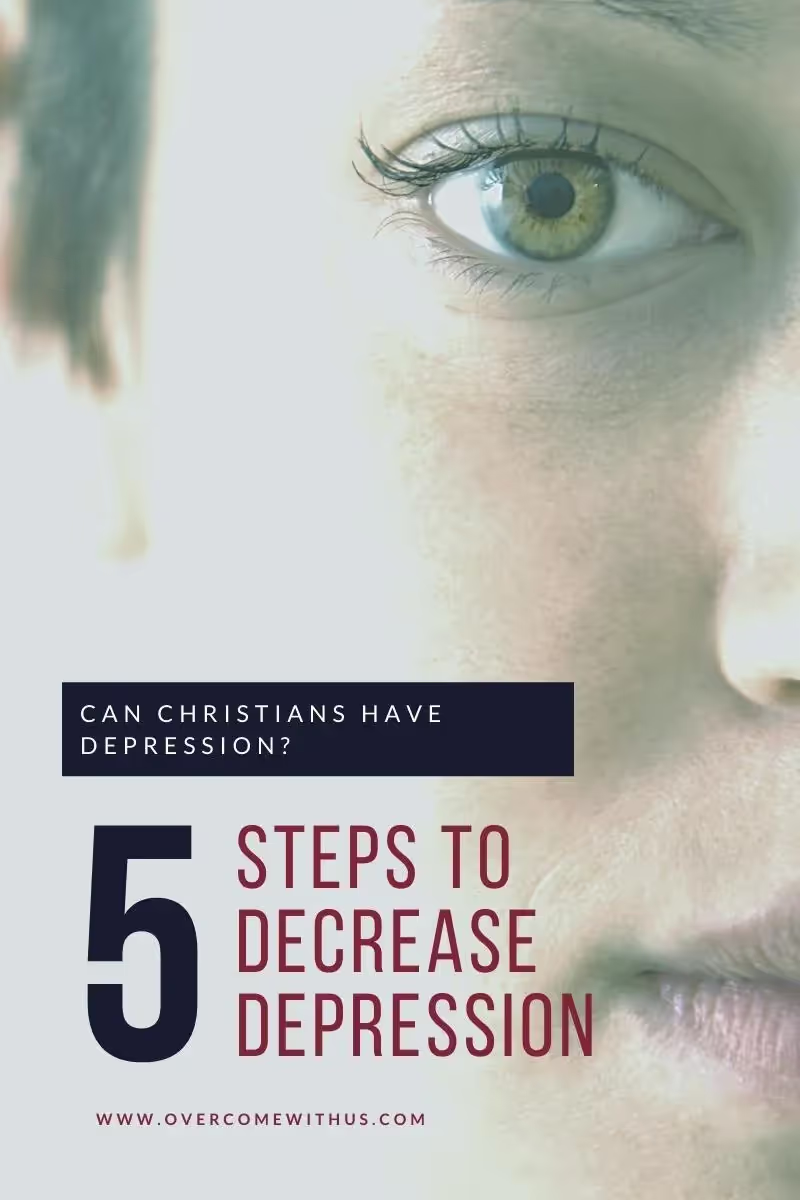Can Christians have depression? Christians can experience depression just as easily as someone who does not proclaim to be a Christian. The complexity of...

Can Christians have depression?
Christians can experience depression just as easily as someone who does not proclaim to be a Christian. The complexity of depression can overwhelm and even try to rob one of their joy like a dark rain cloud about to open up and pour out. Depression can feel like the plague of death overcoming one quietly and quickly until one feels they can no longer succumb from its grip. The good news is as a Christian one knows there is the one true God there to help us through the depths of pain and sorrow into a renewed life in Jesus Christ. Jesus became human to feel what humans feel and to understand the temptations of mankind while being the perfect example of obedience and love. Although we are not perfect, we have hope and peace in Him who gives us strength. These five steps can help a Christian lean into the pain, to change the pain, and turn the pain into joy and peace. Are you ready?
Avoid self-medicating by using any substance (alcohol, drugs, opioids). Self-medication could lead to many other unhealthy consequences and can make a person more depressed.Seeking asistance from a medical professional (doctor) for any possible safe and additional help is a better short-term way to help one's depression. Doctors are much safer to seek help from instead of using a substance.Sek out a mental health professional to talk to about your depression.Therapists are trained to be able to give coping tools (relaxation/deep breathing, mindfulness exercises (using one's five senses to be in the moment), guided imagery (like developing a "happy place" in your mind) and talk therapy.Finding additional support for helping your depression while going through therapy is always good: Christian mentor, Pastor, Stephen's Minister are a few ideas. Having additional people can make one feel safe and supported.One can become so depressed that suicide seems like the only reasonable way to end the pain, yet committing suicide is permanent and seeking help is helps one to take the first step toward life.

Find someone you see as trustworthy to walk with you through this journey of despair to joy. Ask a trusted friend or family member to hold you accountable to check in with them daily and see how you are doing. Jesus even had trusted people on Earth, look to your church, if you feel you do not have a trusted person in your life. Ask your trusted person to spend time with you and meditate on scripture or on the names of God. Count your blessings/ positive thinking (find all the blessings and positive things you can in each day) or ask your friend to ask you how you are doing with your positive thinking and meditation. (Christian counselors, Christian mentors, and Stephen Ministers can also be good resources for help once a week). Below are a few scripture verses one could meditate on: Psalms 121, Romans 5:2-5, Psalm 42.
Psalm 121 A song of ascents1 I lift up my eyes to the mountains—where does my help come from?2 My help comes from the Lord,the Maker of heaven and earth.3 He will not let your foot slip—he who watches over you will not slumber;4 indeed, he who watches over Israelwill neither slumber nor sleep.5 The Lord watches over you—the Lord is your shade at your right hand;6 the sun will not harm you by day,nor the moon by night.7 The Lord will keep you from all harm—he will watch over your life;8 the Lord will watch over your coming and goingboth now and forevermore.
Romans 5:2-52 And we boast in the hope of the glory of God.3 Not only so, but we[b] also glory in our sufferings, because we know that suffering produces perseverance;4 perseverance, character; and character, hope.5 And hope does not put us to shame, because God's love has been poured out into our hearts through the Holy Spirit, who has been given to us.
Psalm 421 As the deer pants for streams of water,so my soul pants for you, my God.2 My soul thirsts for God, for the living God.When can I go and meet with God?3 My tears have been my foodday and night,while people say to me all day long,"Where is your God?"4 These things I rememberas I pour out my soul:how I used to go to the house of Godunder the protection of the Mighty One[d]with shouts of joy and praiseamong the festive throng.5 Why, my soul, are you downcast?Why so disturbed within me?Put your hope in God,for I will yet praise him,my Savior and my God.6 My soul is downcast within me;therefore I will remember youfrom the land of the Jordan,the heights of Hermon—from Mount Mizar.7 Deep calls to deepin the roar of your waterfalls;all your waves and breakershave swept over me.8 By day the Lord directs his love,at night his song is with me—a prayer to the God of my life.9 I say to God my Rock,"Why have you forgotten me?Why must I go about mourning,oppressed by the enemy?"10 My bones suffer mortal agonyas my foes taunt me,saying to me all day long,"Where is your God?"11 Why, my soul, are you downcast?Why so disturbed within me?Put your hope in God,for I will yet praise him,my Savior and my God.

Self-care is crucial for everyday living, yet it is more prudent when one is depressed. Self-care is making sure one is practicing everyday functioning even when one does not feel like it.
The types of self-care are
Here are some ideas of how to practice self-care:
Good sleep hygiene is getting at least getting 10-12 hours if you are between 3- 18 years of age and eight hours if you are 18 and over. It entails going to bed at the same time every night and waking up at the same time every morning and creating a good sleep environment, dark, uncluttered, away from where one works, and quiet.
Planning future events; goals; trips help a person have something to look forward to doing which creates joy. Here are a few ideas one could plan:
When a person changes their routine, it helps the brain to think it is doing something new which makes one feel happy and excited to get up and face the day. Mundane habits can cause one to feel sad.
Here are some ideas for "changing up" your daily routine:
Depression is hard on a person it affects one physically and mentally.
Depression can be very debilitating if one does not take the courage to stand up and act. Depression affects one out of twenty people, so you are not alone. Seek help today, you are worth more than the depression is letting you see.
"Fits of depression come over most of us. Usually cheerful as we may be, we must at intervals be cast down. The strong are not always vigorous, the wise not always ready, the brave not always courageous, and the joyous not always happy."- From When a Preacher is Downcast. C.H. Spurgeon "Life is like photography. We develop from the negatives."- Jason McNaughten, Confessions of a Depressed Christian: How a Pastor Survived Depression & How You Can Too
The teaching of turning the other cheek is about responding to evil with good, not avoiding conflict. It encourages non-retaliation and forgiveness. However, it doesn't mean allowing persistent injustice or abuse.
Start by understanding your worth as God's creation. Then, strive to maintain your integrity, express yourself honestly and respectfully, forgive and respond to evil with good, and rely on God's strength and wisdom in conflicts. These principles can guide you in various situations—whether at work, school, home, or in your community.
Jesus reminded His followers that they might face persecution for standing up for righteousness (Matthew 5:10-12). But He also promised blessings and rewards for those who endure. Therefore, do not fear standing up for what is right, even in the face of adversity.
The Bible encourages us to speak the truth in love (Ephesians 4:15). This means expressing our feelings and needs honestly but respectfully, without resorting to harmful words or actions. Prayer, wisdom, and guidance from the Holy Spirit are also crucial in such situations.
No, standing up for oneself does not conflict with Christian humility. Humility involves recognizing our dependence on God and others, not devaluing ourselves. It's possible to maintain humility while asserting our dignity and rights.